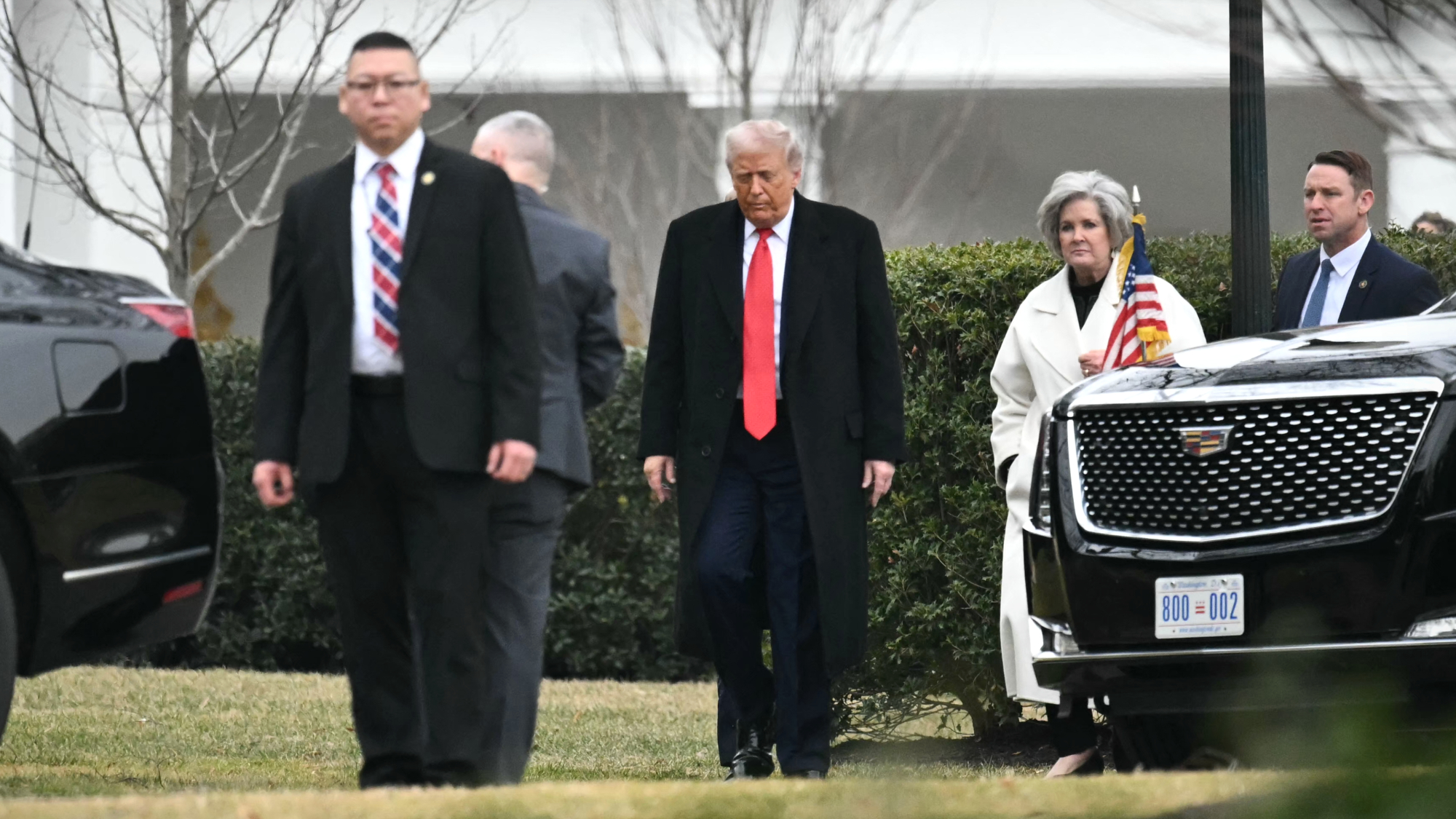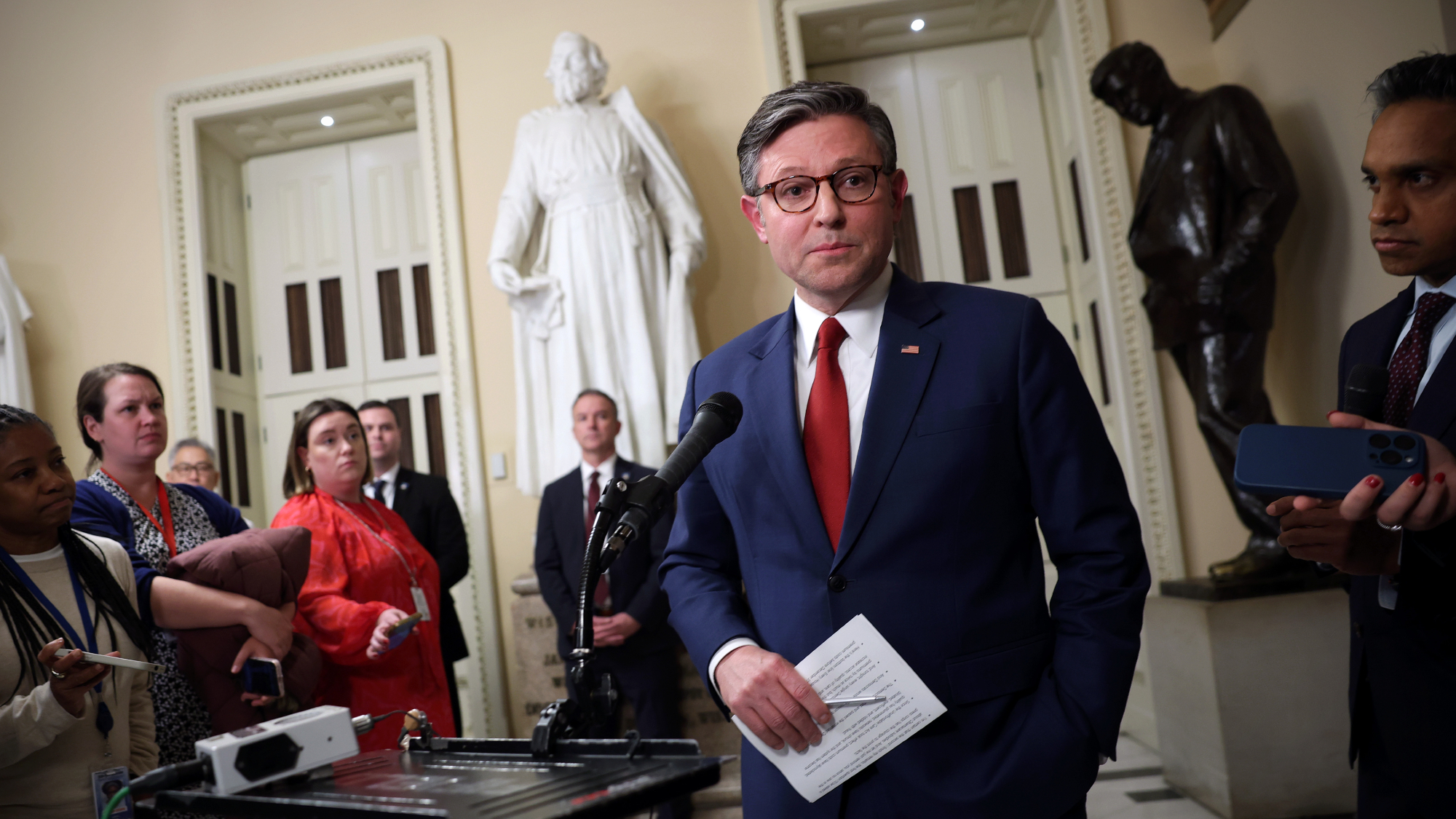4 lessons from CPAC
What the conference showed about the state of the Republican Party


A free daily email with the biggest news stories of the day – and the best features from TheWeek.com
You are now subscribed
Your newsletter sign-up was successful
Former President Donald Trump provided the headliner speech at the Conservative Political Action Conference (CPAC) over the weekend. He painted a gloomy picture of the United States with a Democrat, President Biden, in the White House, and portrayed himself as the only person who can save the Republican Party and the nation. Trump's former United Nations ambassador and current GOP rival, Nikki Haley, got chased into an elevator by Trump supporters after saying in her non-prime-time speech that the GOP needed a new generation of leaders, in a veiled criticism of the former president.
Other Republicans used their time at the podium to call for eradicating transgender rights and stripping Big Tech of the legal immunity social media companies have under Section 230, the protection from liability for what users post that is currently being challenged at the Supreme Court. Far-right Rep. Lauren Boebert (R-Colo.) said in her speech that the liability shield is letting tech executives censor conservative voices, "acting like editors rather than publishers." But some of the GOP's heaviest hitters — including Senate Minority Leader Mitch McConnell (R-Ky.), and likely presidential contenders former Vice President Mike Pence and Florida Gov. Ron DeSantis — didn't show up at the sparsely attended conference. Here are four lessons from this year's event:
1. Trump showed the GOP nomination is his to lose
Many Democrats, and even some Republicans, think Trump's 2024 presidential bid is doomed, said the Texarkana Gazette in an editorial. "His presidency was a fluke, they say. His time has passed." But this year's CPAC showed that "this nomination is still Donald Trump's to lose."
The Week
Escape your echo chamber. Get the facts behind the news, plus analysis from multiple perspectives.

Sign up for The Week's Free Newsletters
From our morning news briefing to a weekly Good News Newsletter, get the best of The Week delivered directly to your inbox.
From our morning news briefing to a weekly Good News Newsletter, get the best of The Week delivered directly to your inbox.
CPAC was "always a big GOP event in the past," but this year's version "was mostly a yawn fest." Nikki Haley "failed to excite the crowd. Presumed candidate and Florida Gov. Ron DeSantis failed to show up." Trump was the only person who really "energized" the crowd, and all he had to do was hit some of "his usual familiar talking points," with "a lot of 'us against them'" mixed in. CPAC's straw poll wasn't even close, with Trump taking 62 percent support for the 2024 nomination, followed by DeSantis with 20 percent and Haley in single digits.
2. Low attendance and energy showed CPAC isn't what it used to be
The big takeaway was "how lame this year's CPAC really was," said Danielle Lee Tomson in Politico. Attendance was low. Energy was low. "Speakers like Donald Trump Jr. and Rep. Marjorie Taylor Greene (R-Ga.) addressed nearly empty rooms." Even the WiFi went out at times. The troubles started before the event when CPAC chair Matt Schlapp faced "sexual assault allegations from a male campaign staffer, a claim he denies," and it was downhill from there.
Former Trump strategist "insisted that despite the lackluster conference, the GOP and its right flank were still strong." He said you could see CPAC's importance in the attendance of "warriors" like failed Arizona gubernatorial candidate Kari Lake and James O'Keefe, a "media provocateur" recently ousted by his own board. With "warriors" like that, who needs enemies? "Vibes matter," and CPAC showed that "conservatives — both Trump and institutional Republicans alike — aren't vibing with each other."
3. CPAC represents what the GOP mainstream has become
This year's CPAC was "eminently mockable," said Joe Walsh in The Bulwark. "There was Steve Bannon accusing Fox News of stealing the election from Donald Trump. And Marjorie Taylor Greene lying that Ukraine President Zelensky demanded American 'sons and daughters to go die in Ukraine.'" The hits kept coming: Kari Lake proclaiming Steve Bannon a "modern-day George Washington," Lauren Boebert "strutting and yelling on stage." The hits kept coming.
A free daily email with the biggest news stories of the day – and the best features from TheWeek.com
But don't let the "richly deserved mockery" convince you these people aren't to be taken seriously. These are the forces that put Trump in the White House in 2016 and almost got him re-elected in 2020. The people at CPAC weren't the "some loony far-right fringe" of the Republican Party. "They are the party." The GOP mainstream has become "radicalized." Its base and activists "no longer believe in truth, they've given up on democracy, they want to destroy their political opponents, and they want an authoritarian to give them back the America they long for."
4. This spotlighted the growing GOP rift
CPAC "underscored the difficulty Republicans will have in keeping their increasingly fractured coalition together for 2024," said Josh Kraushaar in Axios. The GOP used to be defined by the "three core conservative principles" that were the "pillars" of the Reagan revolution: "free markets, a muscular foreign policy, and traditional social values." But Trump's Make America Great Again movement has shifted "the GOP's center of gravity toward a more protectionist, populist, and belligerent outlook."
Signs of the split were everywhere. Trump said the GOP was once "ruled by freaks, neocons, open-border zealots and fools," and promised the party was "never going back to the party of Paul Ryan, Karl Rove, and Jeb Bush." Rep. Marjorie Taylor Greene (R-Ga.) called for Ukrainian President Volodymyr Zelensky to "leave your hands off of our sons and daughters," while "two of the highest-profile speakers — former Secretary of State Mike Pompeo and former U.N. Ambassador Nikki Haley — are unapologetic Ukraine hawks." The fight for the party's 2024 nomination will come down to a duel between Trump, who "is prioritizing the 30 percent of Republicans who consider themselves 'Trump-first Republicans,'" and his rivals who will "compete for backing among those who support the party first."
Harold Maass is a contributing editor at The Week. He has been writing for The Week since the 2001 debut of the U.S. print edition and served as editor of TheWeek.com when it launched in 2008. Harold started his career as a newspaper reporter in South Florida and Haiti. He has previously worked for a variety of news outlets, including The Miami Herald, ABC News and Fox News, and for several years wrote a daily roundup of financial news for The Week and Yahoo Finance.
-
 Local elections 2026: where are they and who is expected to win?
Local elections 2026: where are they and who is expected to win?The Explainer Labour is braced for heavy losses and U-turn on postponing some council elections hasn’t helped the party’s prospects
-
 6 of the world’s most accessible destinations
6 of the world’s most accessible destinationsThe Week Recommends Experience all of Berlin, Singapore and Sydney
-
 How the FCC’s ‘equal time’ rule works
How the FCC’s ‘equal time’ rule worksIn the Spotlight The law is at the heart of the Colbert-CBS conflict
-
 House votes to end Trump’s Canada tariffs
House votes to end Trump’s Canada tariffsSpeed Read Six Republicans joined with Democrats to repeal the president’s tariffs
-
 How are Democrats trying to reform ICE?
How are Democrats trying to reform ICE?Today’s Big Question Democratic leadership has put forth several demands for the agency
-
 Is Alex Pretti shooting a turning point for Trump?
Is Alex Pretti shooting a turning point for Trump?Today’s Big Question Death of nurse at the hands of Ice officers could be ‘crucial’ moment for America
-
 Halligan quits US attorney role amid court pressure
Halligan quits US attorney role amid court pressureSpeed Read Halligan’s position had already been considered vacant by at least one judge
-
 House approves ACA credits in rebuke to GOP leaders
House approves ACA credits in rebuke to GOP leadersSpeed Read Seventeen GOP lawmakers joined all Democrats in the vote
-
 Vance’s ‘next move will reveal whether the conservative movement can move past Trump’
Vance’s ‘next move will reveal whether the conservative movement can move past Trump’Instant Opinion Opinion, comment and editorials of the day
-
 The MAGA civil war takes center stage at the Turning Point USA conference
The MAGA civil war takes center stage at the Turning Point USA conferenceIN THE SPOTLIGHT ‘Americafest 2025’ was a who’s who of right-wing heavyweights eager to settle scores and lay claim to the future of MAGA
-
 House GOP revolt forces vote on ACA subsidies
House GOP revolt forces vote on ACA subsidiesSpeed Read The new health care bill would lower some costs but not extend expiring Affordable Care Act subsidies
